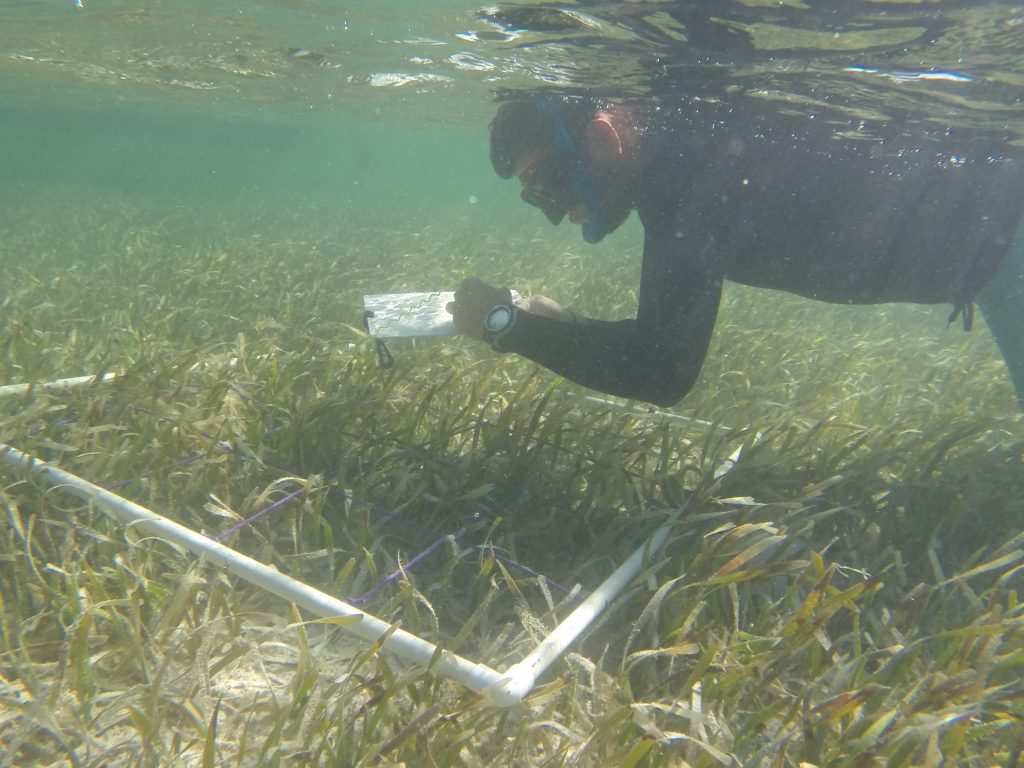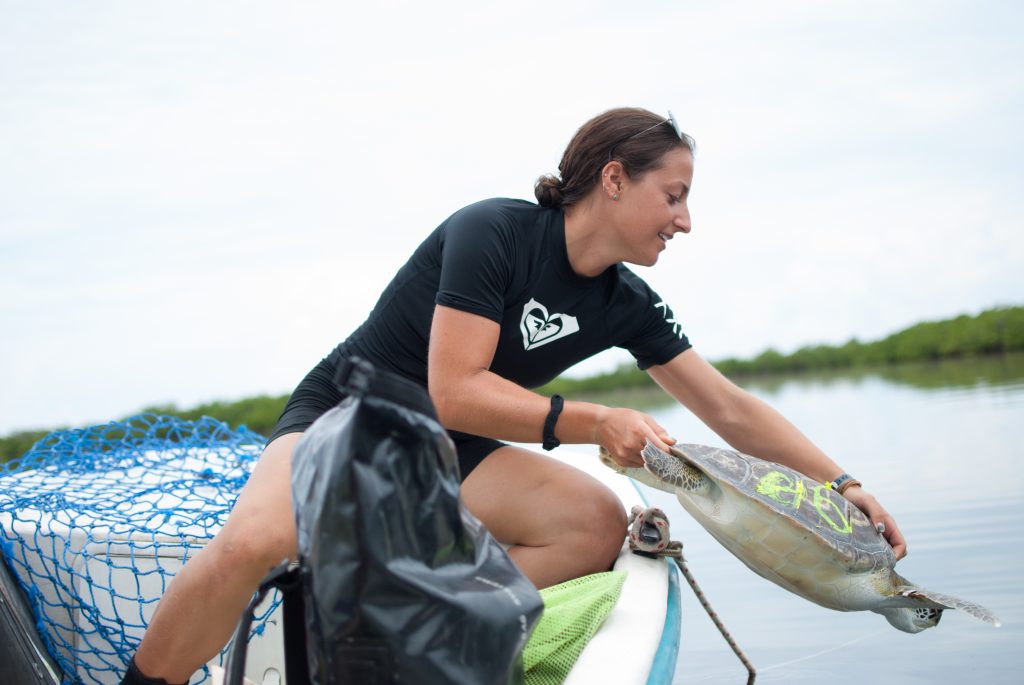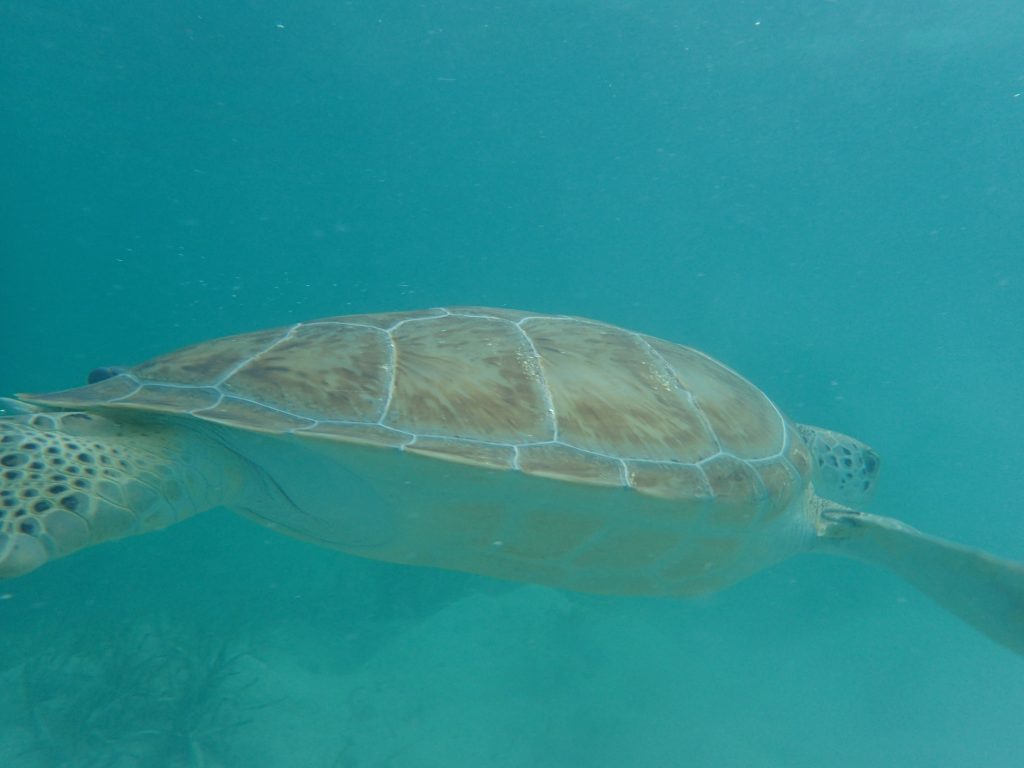Foraging and nutrient acquisition are fundamental to a species’ survival, influencing their growth, reproduction and ultimately population viability. The Marine Turtle Research, Ecology, and Conservation Group addresses research questions related to how marine turtles interact with their environment, through their foraging and feeding strategies, including diet composition and selection and how these changes over time. Our projects also aim to better understand how alterations on species foraging ecology may affect marine ecosystems and on determining the ecological roles of marine turtles.
FORAGING ECOLOGY OF MARINE TURTLES
SPECIFIC PROJECTS
- Implications of sea turtle health to the dynamics of seagrass ecosystems
- Caught on Camera: The Secret Lives and Foraging Behaviors of Loggerhead Turtles in Florida’s Big Bend
- Life on Loggerheads: an integrated epibiotic study to assess foraging behavior, reproductive success, and habitats of Northern Gulf of Mexico loggerheads nesting at St. George Island
- Interactive Assessment of a Loggerhead Foraging Aggregation in Crystal River Year
PUBLICATIONS
Gama LR, Seminoff JA, Lemons GE, Fuentes, M. M. P. B. , Pellizzari, F., Meira-Filho, M. R. C., Rosa, L., Vélez-Rubio, G. M., da Silveira, E. L., & Domit, C. (2024). Diet composition of juvenile green turtles in the Southwestern Atlantic Ocean: long-term insights from a beach stranding program. Mar Ecol Prog Ser 727:159-179.
Weber, S., Cullen, J. A., Fuentes, M. M. P. B. . (2023). Isotopic niche overlap among foraging marine turtle species in the Gulf of Mexico. Ecology and Evolution, 13(11), e10741.
Weber, S.M., Ceriani, S.A., Fuentes, M. M. P. B. (2023). Foraging ecology of Kemp's ridley (Lepidochelys kempii) turtles in the northeastern Gulf of Mexico: insights from stable isotope analysis. Marine Biology. 170:104 .
Silver-Gorges, I., Ceriani, S. A., Fuentes, M. M. P. B. (2023). Fine-scale intraspecific niche partitioning in a highly mobile, marine megafauna species: implications for ecology and conservation. Royal Society Open Science. https://doi.org/10.1098/rsos.221529
Gama, L.R., Fuentes, M. M. P. B. , Trevizani, T. H., Pellizzari,F., Lemons, G.E., Seminoff, J.A., Domit, C. (2021).Trophic ecology of juvenile green turtles in the Southwestern Atlantic Ocean: insights from stable isotope analysis and niche modelling. Marine Ecology Progress Series.
Silver-Gorges, I., Ingels, J., dos Santos, G. A. P., Valdes, Y., Pontes, L. P., Silva, A. C., . . . Fuentes, M. M. P. B. (2021). Epibionts reflect spatial and foraging ecology of Gulf of Mexico loggerhead turtles (Caretta caretta). Frontiers in Ecology and Evolution, 9(388).
Gillis, A.J., Wildermann, N.E., Ceriani, S.A., Seminoff, J.A., Fuentes, M. M. P. B. (2020) Evaluating different spatial scales of forage item availability to determine diet selection of juvenile green turtles (Chelonia mydas). Marine Biology 167, 170.
Putillo, A. R. Flint, M., Seminoff, J., Spencer, R.G.M., Fuentes, M. M. P. B. (2020). Plasma biochemistry profiles of juvenile green turtles from the Bahamas with potential influence of diet. Journal of Wildlife Diseases, 56(4), 768-780.
Wildermann, N.E., Sasso, C.R., Stokes, L.W., Snodgrass, D., Fuentes, M. M. P. B. (2019). Habitat use and behavior of multiple species of marine turtles at a foraging area in the Northeastern Gulf of Mexico. Frontiers in Marine Science. 6, 155.
Gillis, A. J., Ceriani, S. A., Seminoff, J. A., Fuentes, M. M. P. B. (2018). Foraging ecology and diet selection of juvenile green turtles in the Bahamas: insights from stable isotope analysis and prey mapping. Marine Ecology Progress Series, 599, 225-238.
COLLABORATORS
Jeffrey Seminoff, NOAA
Nathan Robinson, Wild Blue Science
Simona Ceriani, Florida Fish and Wildlife Conservation Commission
Jeroen Ingels, FSU Marine Lab
Camila Domit, Laboratory of Ecology and Conservation at the Federal University of Paraná
Jonathan Lefcheck, MarineGEO, Smithsonian Institution
Brian Shamblin, University of Georgia
Nathan Robinson, Wild Blue Science
Simona Ceriani, Florida Fish and Wildlife Conservation Commission
Jeroen Ingels, FSU Marine Lab
Camila Domit, Laboratory of Ecology and Conservation at the Federal University of Paraná
Jonathan Lefcheck, MarineGEO, Smithsonian Institution
Brian Shamblin, University of Georgia
FUNDING
Sea turtle License Plate
National Geographic
The National Academies of Sciences, Engineering, and Medicine
National Geographic
The National Academies of Sciences, Engineering, and Medicine



